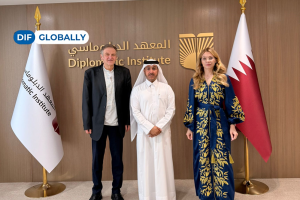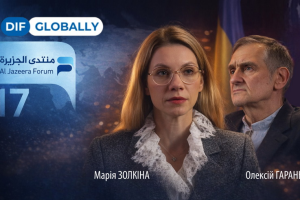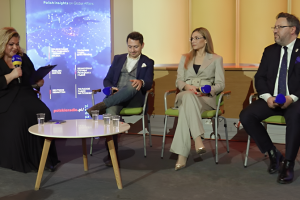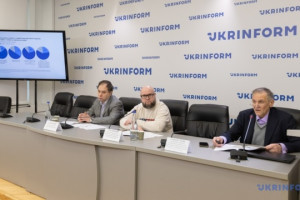What Ukraine’s civil society wants to tell at Biden’s Global Democracy Summit
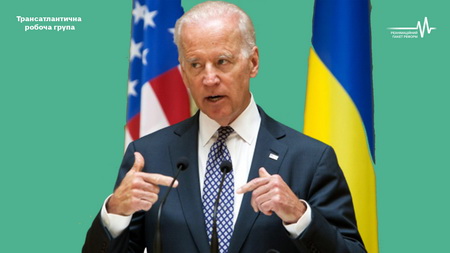
Source: РПР
On the eve of the summit, Orest Deychakiwsky, a former senior policy advisor at the Helsinki Commission outlined the context of the situation with democracy in the country:
- Ukraine already made its choice towards democracy. Just on 1 December 2021, the country celebrated 30 years since the referendum on the independence of Ukraine from the USSR, by which the country defined its further path.
- As everywhere globally, however, democracy in Ukraine is challenged and faces serious threats.
- The activity of civil society will be key to any success given the essential role of NGOs and independent media in defending human rights and promotion of democracy and the rule of law.
Therefore, at the Transatlantic Task Force on Ukraine leading civil society actors discussed the main challenges Ukraine’s democracy faces.
Reforming the country during a war
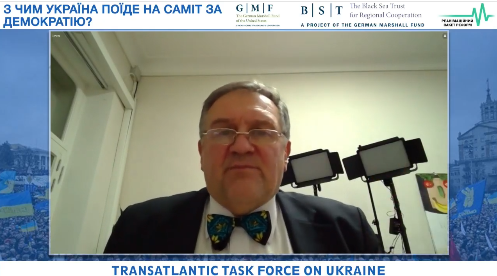 Commenting on the latest democracy index which refers to Ukraine as a hybrid regime placed between authoritarian regimes and democratic countries, Oleksiy Haran, head of research at the Ilko Kucheriv Democratic Initiatives Foundation, states that despite problems related to corruption and rule of law, Ukraine still is a democracy and deserves a better place. Together with that, Ukraine is the only country in Europe that is resisting Vladimir Putin’s aggression.
Commenting on the latest democracy index which refers to Ukraine as a hybrid regime placed between authoritarian regimes and democratic countries, Oleksiy Haran, head of research at the Ilko Kucheriv Democratic Initiatives Foundation, states that despite problems related to corruption and rule of law, Ukraine still is a democracy and deserves a better place. Together with that, Ukraine is the only country in Europe that is resisting Vladimir Putin’s aggression.
“And we are to do reforms in these difficult times of war. Moreover, we are to do these reforms and sometimes very unpopular reforms in times of freedom. We have freedom of speech, we have pluralism. So every Ukrainian government is criticized.”
Haran is confident that the reform potential of the Ukrainian government, in particular president Volodymyr Zelenskyy’s government, is not lost. However, there are serious problems. They are related to populism and the fact that institutions in Ukraine are not very stable.
Among the positive aspects, according to Haran, is the fact that the so-called Russian vector totally collapsed.
“Our polls and polls of other companies demonstrate that the number of Ukrainians who would like to join the so-called Eurasian Union with Russia is about 10%. Now, most Ukrainians are in favor of joining the EU and NATO.”
The expert stresses that Ukrainians have high expectations related to western support and not fulfilling them can lead to a dangerous situation.
In August this year. Haran’s Ilko Kucheriv Democratic Initiatives Foundation conducted a poll asking whether people are afraid of increasing force and influence in certain countries. Predictably, in it, Russia was the country Ukrainians were afraid of (65%). Surprisingly, the US turns out to be the second one (62%).
Haran assumes that if Ukrainains’ expectations regarding western support are not fulfilled, it would create a dangerous moment that Russia might use.
“What Putin did in spring of this year I think was quite successful for Russia as he raised rates. He blackmailed Ukraine and the West, then he withdrew his forces from Ukraine but instead pushed for Nord Stream 2. And actually, this project was basically accepted.”
The expert summarizes that Ukrainian civil society and media are concerned of how the West would react when Putin raises rates and whether the West would stay tough defending Ukraine.
As well, Haran calls to be cautious towards Chinese influence in Ukraine. While its CoronaVac vaccine is one of the two most popular vaccines among Ukrainians (together with Pfizer) due to its simplicity and no complications, China might use it to influence the Ukrainian agenda.
In general, Haran remains optimistic regarding the Ukrainian path stating that the country is moving in the right direction. He also calls on its international partners to reconsider the approach when Ukraine is provided with support in replacement for reforms.
“Even without reforms, we need support because we are fighting Russia. And we are fighting it even if we have problems within the country. Problems regarding democracy and rule of law. But still Ukrainian soldiers are there.”
Haran concluded that Ukrainian soldiers are defending not only Ukraine, but Europe as well
Horrifying human rights situation at the occupied territories
Talking about the human rights aspects of democracy, Oleksandra Dvoretska, board member at the RPR Coalition and board member and advocacy coordinator at East-SOS calls to look first at the situation in the occupied territories.
In 2014, Dvoretska left her home in Crimea due to the occupation herself. Having no opportunity to return, she closely monitors the situation there and provides some horrifying statistics:
- There are 127 activists or citizen journalists detained or convicted because of falsified cases in Crimea, 95 out of them are Crimean Tatars.
- The average term of conviction is from 15 to 17 years of imprisonment.
- Most often people serve sentences in violation of the provisions of international law – as they are taken from Crimea to Russia.
- As well, 38 people in Crimea were detained by the so-called authorities or police and went missing. Their fate remains unknown.
- There is a violation of freedom of religion, and not only towards Crimean Tatars, who are ethnic Muslims — Jehovah’s Witnesses are persecuted too. Ukrainian Catholic Church’s property is taken away.
- The occupants made it impossible for Ukraine’s and international media to work at the peninsula.
“Today it is hard for us to receive at least any objective information from these territories,” Dvoretska says.
Together with that, Russia continues the policy of the peninsula’s militarisation. In violation of international law, Russia conscripts men from the territory it occupied to its military. According to Dvoretska, this concerns some 30,000 Crimeans. Also, Russia relocates works of art, destroys architectural monuments, and replaces the native population with settlers from Russia.
“Everything that is pro-Ukrainian must either leave the peninsula or be persecuted,” the expert concludes and adds that the situation could be worse only in the occupied Donbas.
“More than 2 million people there don’t have any mechanisms of protection of their rights — Russia does not recognize its jurisdiction there.”
As told by Dvoretska, at least 15,000 people had been held captive by the Russian-militant forces. These included ordinary civilians and those who implemented their professional duties, including journalists. More than 300 people are now held in illegal places of imprisonment. Nearly 14,000 people, both soldiers, and civilians, were killed so far over the years of war during 2014-2021.
Due to the pandemic, the situation worsened, as Russia or its proxies received more reasons to justify restrictions in crossing its borders.
“The practice of severing ties with people has a very strong impact on the further realization of the rights of these citizens who remained to live in the occupied territories.”
Therefore, Dvoretska stresses how important it is for Ukraine’s partners to talk about the necessity of the work of international organizations in these territories.
Talking about the human rights situation in the territories controlled by the Ukrainian government, the expert points at some challenges. In particular, the right to a fair trial, freedom of speech, access to quality medical services, and education. However, the situation can’t be compared to what happens in the occupied territories, neighboring Russia or Belarus.
Every day, Ukrainian civil society and the Ukrainian government make steps forward to address these challenges, Dvoretska notes. Even so, the situation with the attacks on activists in Ukraine remains to be worrying.
Referring to ZMINA Human Rights Centre data, Dvoretska points out that during the first nine months of the year 2021, 88 attacks on activists across Ukraine took place. During the whole previous year, there were 77 attacks. According to the expert, activists in Ukraine experience threats, informational attacks, intimidations, destruction of their property, and physical attacks. However, these cases are not investigated.
“In 95% of incidents, law enforcement forces do not even open cases.”
None of the cases opened have been properly resolved, including the most famous one – the murder of the Kherson city activist Kateryna Handziuk in 2018. Who ordered this crime is still unknown.
“I think the solidarity of Ukrainian civil society does not let this wave to turn into a mass practise. But for sure, law enforcers have a rather passive role. They do not investigate these cases proactively.”
Dvoretska summarizes that it is another field where international recommendations and cooperation can be helpful.
Ukraine’s democracy vs Russia’s evolving strategies of information war
Maksym Panchenko, deputy head of the analytical department of Internews Ukraine, points out that Ukraine is the largest democracy in Europe territorially speaking, and is in the top-seven European democracies population-wise. He believes that the country should be addressed as a watershed between Russia and the West and the watershed between democracy and authoritarian regimes.
Ukraine has boosted its democratization since 2014 on an unprecedented scale. However, Russia is learning, adjusting, and developing its strategies too.
According to Panchenko, the major narratives that Russia is trying to disseminate about Ukraine have not changed. The main ones state that Ukraine is a failed state and that it does not exist as an independent entity. A sub-narrative states that if Ukraine is not supported by Russia, it will be governed from abroad — from Washington or from Brussels. As well, Russia is trying to sell the West a “Nazi narrative” about Ukraine via its TV channels, the purpose of which is persuading not only western civil society, but also western governments not to support Ukraine.”
To promote this narrative, Russia brings in all the powers of its propaganda machine.
As well there is a group of historical narratives called to prove Russia’s alleged right to Ukraine.
“It can’t be overstated that free media and the civil society in Ukraine are crucial for combating disinformation and for combating Russia’s narratives.”
Panchenko stresses that if Ukraine does not fall under Russia’s influence, the West will benefit from having Ukraine in its own camp, taking advantage of the resources and experience Ukraine has from war with Russia, including the hybrid warfare.
“What we need to bring to the summit next week is an understanding of not only what Ukraine can contribute to the West, but also an understanding of why Ukraine in itself as an entity and geopolitical entity is very much a cornerstone for not only national but also regional and international processes. And the West needs Ukraine in its camp.“
Talking of how the West can help, Panchenko mentions infrastructure to counter propaganda proactively, before it is even disseminated. For that, cooperation with western governments is crucial.
Among the top priorities that had to be addressed at the summit, the experts also named the issue of Ukrainian political prisoners of the Kremlin and energy security.





